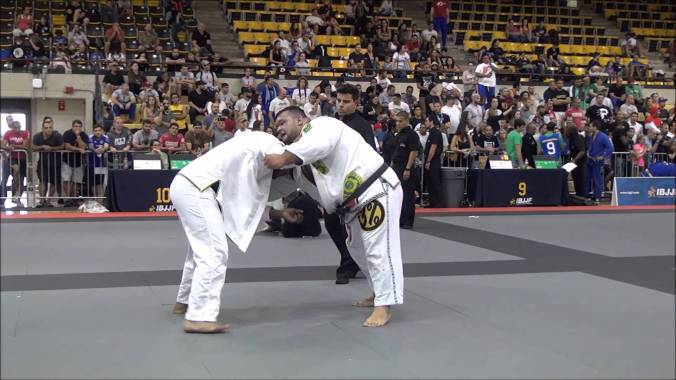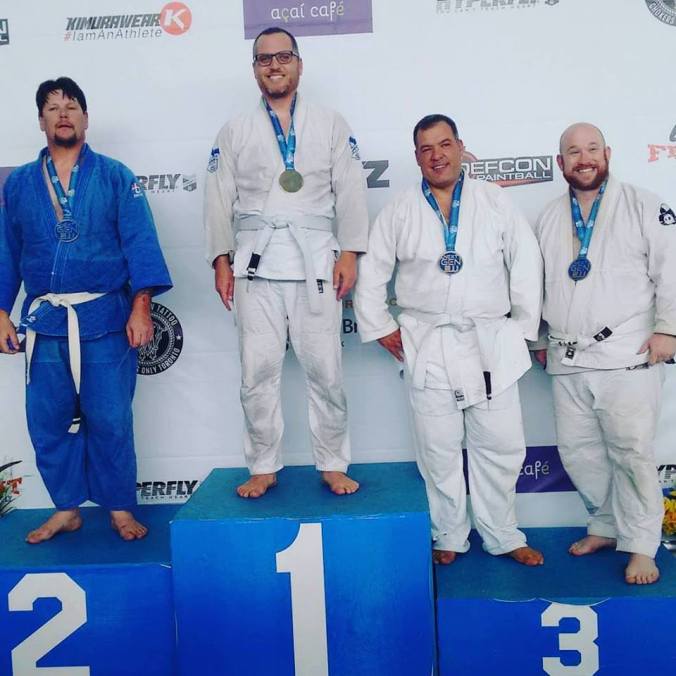
(Photo courtesy Aaron Broverman)
One of the great things about Brazilian jiu-jitsu is that it’s allowed me to meet all types of amazing people. Humans of Brazilian jiu-jitsu is an opportunity to talk to and about a few of them.
Aaron Broverman is a journalist, podcaster and comic book nerd from Surrey, B.C. He’s also a BJJ purple belt who trains at Toronto BJJ, a Jiu-Jitsu for Life affiliate in Toronto’s Bloorcourt neighbourhood. He started training BJJ in February 2012. He has lived in Toronto for 13 years, and has lived with spastic diplegia cerebral palsy since birth.
On adaptive jiu-jitsu
All Brazilian jiu-jitsu is adaptive jiu-jitsu. Hélio Gracie adapted traditional jiu-jitsu because he was a small, frail guy who was always breaking his legs. True adaptive jiu-jitsu, though, is two people with disabilities facing off against each other. There aren’t many of us, but we do exist. The nature of my disability is that I can’t do every move, but the thing about jiu-jitsu is you don’t have to know everything. You don’t have to be able to Berimbolo effectively or De La Riva effectively to beat someone. I can beat someone just as well using the simpler moves.
On the difference between fighting able-bodied people and other fighters with disabilities
When you’re a person with a disability fighting an able-bodied person, you basically know what they’re going to do. They’re going to pull guard, they’re going to try to pass in a certain way from a certain position. What’s really scary is when I fight another person with a disability, because I don’t know what they know. I don’t know how they’ve adapted. Let’s say I’m facing a dude who is a paraplegic. So his upper body is fine, but his lower body is just his legs flopping around. I don’t know he’s going to do. I don’t know what his weapons are.
On able-bodied people ‘taking it easy’ on him
I love it when able-bodied people give me the benefit of the doubt. When they think I’m not going to be able to do things at a regular speed and they’re like ‘Oh I’ll do him a favour.’ That’s awesome. If you want to take me lightly, feel free. I’ll take that opening and I’ll win. And I don’t care if you ‘let me win.’ The result is the same and all that means is you defeated yourself. You still lost. Whatever narrative you have to have in your head, because you feel weird about rolling with a dude with a disability, I don’t care. Cool, I don’t have to work as hard. I’ll just have more energy for my next match. Because most of the time you’ll never know if someone ‘gave it to you’ or if you’ve earned it. So, in order that I don’t drive myself nuts thinking about it, I’ve decided it doesn’t matter. That’s their issue. It’s not my issue. I’m just gonna roll the way I roll.
(Quotes have been condensed and edited for clarity.)
You can follow Aaron on Twitter at @Broverman. You can read his writing here. You should definitely listen to his podcast, Speech Bubble, which you can download here.



